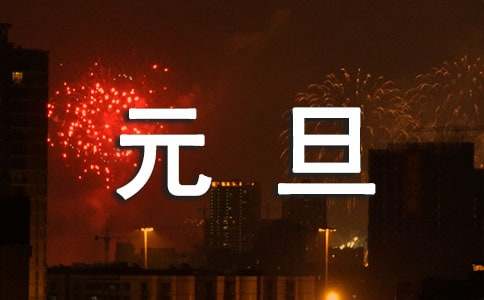- 相關(guān)推薦
元旦做什么事英文
元旦是新年的第一天,世界各國的人民都自己獨特的慶賀方式,下面小編就整理了一些關(guān)于元旦的習(xí)俗,一起來了解一下吧!

【Customs】
1. Kaisui(beginning of the year): According to the Chinese traditional custom, starting from haishi(9p.m. to 11p.m.)of the last evening of the twelfth lunar month, each family must prepare offering s to deities at the altar. At the same time, they too prepare food for the New Year day: The whole family will then stay awake together to attend to the year(called shou sui).
After haishi, zishi(11p.m. to 1a.m.)will come, and this is the arrival of New Year(Yuandan). At this moment, people begin the celebration with fireworks. Vegetarian and sweet foods will then be placed are the altar for offerings, and incense be burned to welcome the deities. In the ancient times, it was believed that haishi connected the two years and thus was called kaisui.
At the same night, some families will follow the instruction in Tongshu and place preparing altar in the direction of the "fortune deity" during the "fortune time" to receive the deity. If the direction of the "fortune deity" is at the "ill position", people will choose to receive "happy deity" or "noble deity" instead.
2. There is an apparent difference in the custom of food taking on Yuandan between the Chinese in the northern and southern regions. The northern Chinese has the habit of taking jiao zi(dumpling made of flour with vegetable and meat wrapped inside).
Some people may put a sweet or a coin inside jiao zi, hoping to have a sweet year after tasting the sweet and a wealthy year after tasting the coin. on the other hand, the southern Chinese have the taboo for killing on Yuandan.
Therefore, they do not take meat in tee morning of Yuandan, so as to avoid bloodshed or mutual slaughter. In order to evade misfortune, they have the first meal of this day without meat. Instead, they take vegetarian food for the sake of virtue.
3. What is special during the New Year is that parents or elders will distribute red packets(ang pao or ya sui qian)to the children. People in the ancient times were more particular in giving away the red packets: the distribution took place on the eve of New Year so that the kids could suppress the past year and enter the New Year.
Ya sui has the meaning of overcoming the unpredictable future. Representing the wishes for the healthy psychological growth of the children, ya sui qian symbolises the elders' hope to see their children overcome all the unpredictable elements brought by the "year".
4. There is an extraordinary number of taboos on Yuandan. Each place has its own customs of taboo. Here, we will mention only a few common taboos in Fujian Province, Guangdong Province and Southeast Asia:
In the past, people commonly believed that fortune was hidden in the house. So, w\sweeping of floor must be done in the direction moving inwards, and there was no clearance of rubbish at night.
Particularly on the New Tear day, in order to keep fortune from flowing out, there was no sweeping.
Some families kept this taboo until the fifth or even the fifteenth day. If anything was broken, the pieces were wrapped up in order not to let the fortune slip away and were disposed only the fifth day.
Yuandan(in more serious families, the period extends from the 1st to the 15th day) marks the new beginning. In the hope that New Year brings good beginning, people should utter neither unkind words nor vulgar language.
Making noises, fighting, quarreling and especially weeping are avoided to deter misfortune. There are even taboos of taking medicine and having sneeze, for it is believed that they can lead to sickness throughout the year.
Taboos of the past also concerned the use of knife and the breaking of things. If a thing was broken, the word "break" or any other word importing similar meaning was not used.
Instead, words like "failing to the floor and blossoming like flowers" which delivered pleasant senses were used to suggest good connections.
On Yuandan, neither lending and nor giving of money to others is done so that there will be no out-flowing of money during the year. There is also the saying that if a male sleeps in the afternoon, his career will breakdown, and if a female has an afternoon nap, the kitchen will collapse.
5. Ancient rite: In the past, there was a rite called he zheng(proper greeting)during New Year. When a person paid a New Year visit to friends or relatives, he took along a piece of paper or card on which the name of the host was written wit Chinese brush. The receiver of this greeting card would normally paste it on the wall of his main hall to show his respect to and appreciation for the visitor.
The quantity of greeting card received reflected the person's public relationship with others, while the names and status of the people who gave the greeting cards indicated the host's boundary of social network and standard of living.
Nowadays, because of easy communication, convenient transportation system and wider social network, when people send their greetings they tend to follow the Western style. The greeting is now done by mail and even by email. Today, he zheng is done by simply bringing along red packets and food presents when making a visit.
【元旦做什么事英文】相關(guān)文章:
元旦英文祝福09-18
元旦英文賀詞10-03
元旦賀詞英文07-26
元旦英文名10-26
元旦英文翻譯08-29
元旦的英文是什么01-04
元旦的英文單詞06-30
元旦英文歌07-21
元旦英文小報內(nèi)容09-08
元旦英文說法09-23